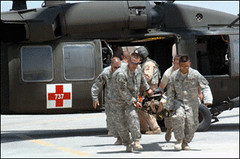By Staff Sgt. Mark Watson 129th Mobile Public Affairs Detachment
BAGRAM AIRFIELD, Afghanistan — While patients teeter between life and death, the Soldiers of the 14th Combat Support Hospital’s Intensive Care Unit fight to keep them alive.
Deployed to Bagram Airfield, Afghanistan, the dedicated Army nurses of the Fort Benning, Ga.,-based ICU care for a wide variety of patients.
“The ICU here at Bagram is the main ICU for Afghanistan,” said Sgt. Josue Contreras, a licensed practical nurse from Chicago, Ill. “We take care of anyone from local nationals, Afghan police, Afghan National Army, Afghan special forces, coalition and contract personnel.”
The variety of medical problems that the nurses treat is as eclectic as the people.
“We (treat) anything from medical problems to surgical issues to trauma injuries of any kind, from someone stepping on a landmine, IEDs, gunshot wounds, burns, you name it,” Contreras said.

1 comment:
And as one of three Level 3 hospitals in Afghanistan the crews stay busy.
“Our first five months here were extremely busy,” he said, recalling how some patients would come from right outside the gate and flown in from all over Afghanistan. “We’re a little slow right now which gives us a little break, but on any given Sunday, we could go from three patients to 15.”
Treating so many patients can take its toll on the staff, especially when they lose the fight to keep their patients alive.
“We talk about it all the time,” said Capt. Leilani Manuel, a LPN of Norristown, Pa.
And the hours of talking and joking around is what keeps the Soldiers going.
“Some of the humor here, if you were to take a snapshot, probably would come off pretty callus,” Manuel said. “But after seeing it every single day it starts to wear thin on you. You almost become numb to some of the things that happen. It’s just our way to deal with grief.”
Contreras agreed.
“Kids dying, when you deal with that every other day it takes a toll on you and the only thing that keeps us going is each other,” he said. “We may not be in the dirt getting shot at, but we see what is left of those engagements, and we may not be the first responder who picks up a kid who just stepped on a landmine, but we are the ones who treat the kid from the day of his injury to the day he walks out of here or the day he dies.”
In addition to each other, the hospital staff will talk with their head nurse as well as a chaplain if needed.
Although losing patients still affects the Soldiers they are getting used to the fact that some patients die.
“At first (losing a patient) affected me really bad,” Contreras said. “I would think ‘what are we doing keeping dead people alive.’ You start to resent it almost, but then you remember the people who do make it out of here and that makes you feel good. So, we got to the point where we all accepted the fact that some would make it and some wouldn’t. But we give everyone the chance … we do what we can and accept that.”
And the staff is reminded of how much punishment the human body can take. Occasionally, severely injured patients will be admitted into the ICU. While their prognosis is grave at best, they somehow manage to make a recovery and walk out of the ward under their own power.
Despite the fact that some patients will not live even under the best of conditions, the patients are given the best care possible in the war-torn country.
“I don’t wish anyone to come here having to see us,” Contreras said. “But (if they do) we fight for them. He may be my patient, but every nurse in here is helping me out making sure I have everything I need to take care of him.”
Post a Comment